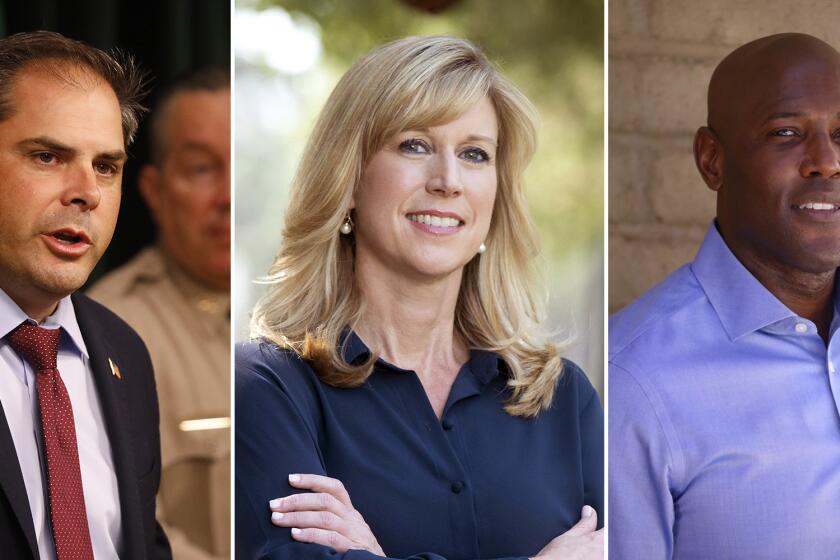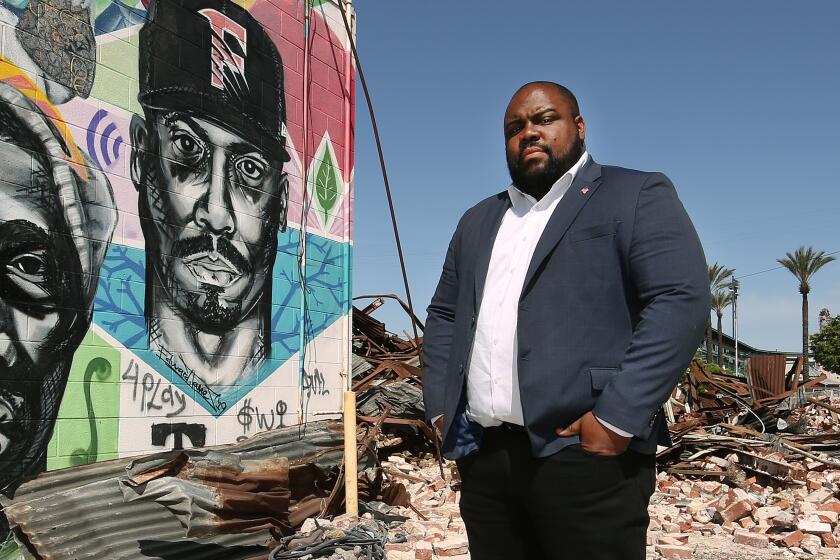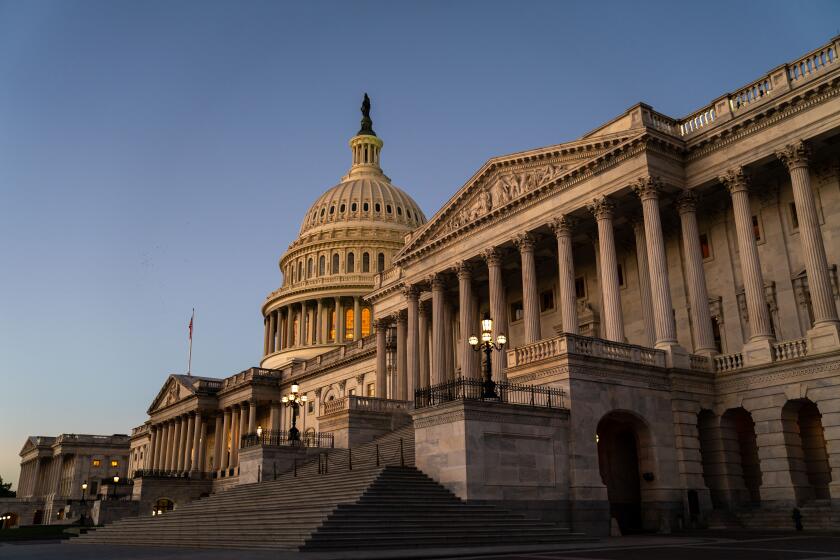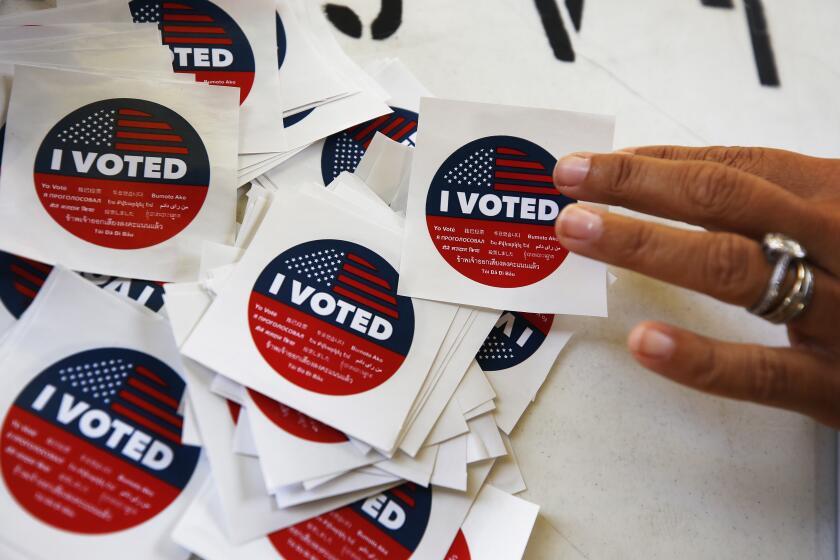Democrats seek to end California’s drought of Black men in Congress
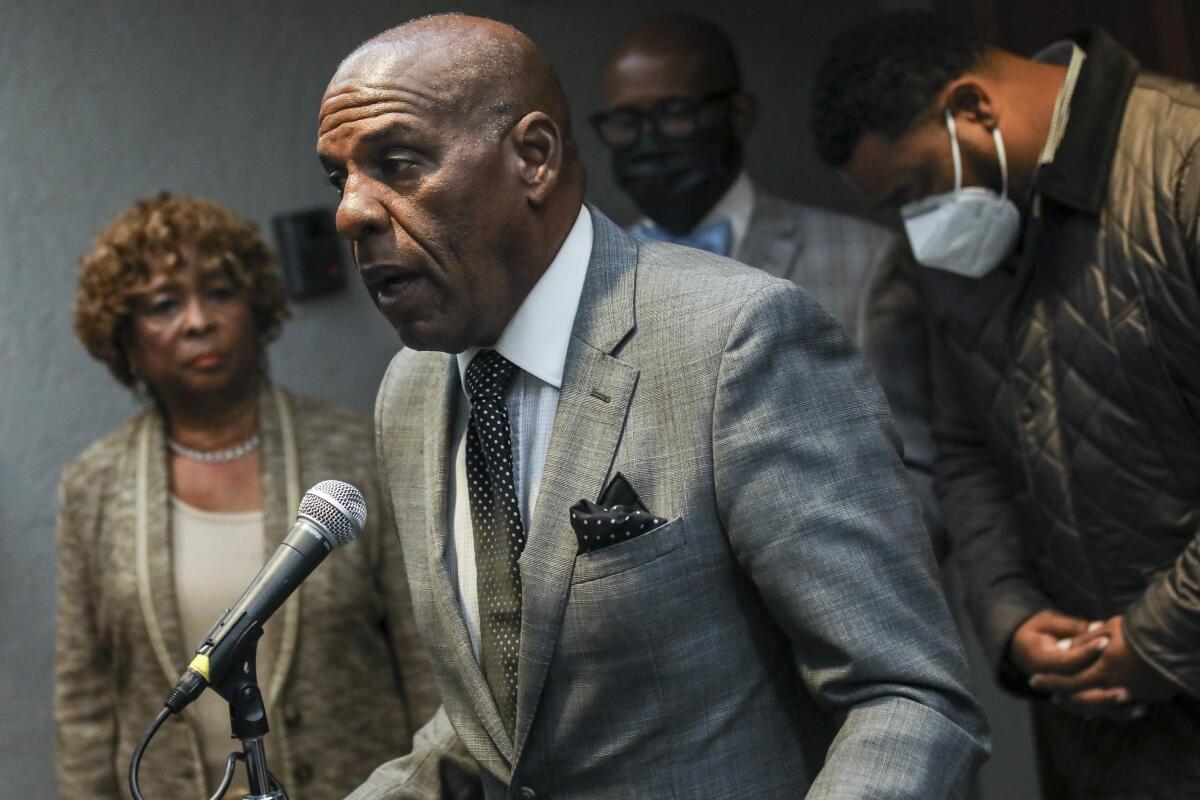
- Share via
WASHINGTON — California gave the nation its first Black vice president. But no part of the state has sent a Black man to Congress in more than 20 years.
It’s a statistic so surprising that not even Black men running for House seats this cycle were aware of the drought in representation until the Los Angeles Times highlighted it in November.
“I can truthfully tell you that no, it never crossed my mind,” said Quaye Quartey, a Black Democrat who is running against Rep. Mike Garcia (R-Santa Clarita) and third-time Democratic candidate Christy Smith in Tuesday’s primary.
Quartey, a Ghanaian American who served as an intelligence officer in the Navy and later as a military diplomat, said The Times’ reporting opened people’s eyes “to the fact that we have a tremendous opportunity before us.”
California politicos point to several factors to explain why it’s been so long since even one Black man was a member of the nation’s largest congressional delegation.
Among them are a national shift toward recruiting more women for office, a dearth of opportunities for Black men to run, and a false narrative of where Black candidates can win.
A shift toward women
In most states that have had a “historic first” Black member elected, it was a man, according to Christian Grose, a political science and public policy professor at USC.
“This was when women were less likely to be elected formally, but participated pretty heavily in sort of behind-the-scenes politics,” Grose said in an interview. “Then there was sort of this breakthrough moment where a lot of Black women got elected in 1992 with some of the new racial redistricting that happened. We saw some of that in California, too. And then there was a general move toward more women running for Congress and winning starting in the 1990s and the 2000s.”
In the California primary election, these two Democrats are vying to challenge Rep. Mike Garcia, one of the most vulnerable Republican members of Congress.
In 1992, two dozen new women were elected to the House, and three women to the Senate. In 2018, a record-breaking 37 women were elected to Congress. The dramatic increase in women winning office that year was attributed to the backlash against President Trump.
Jimmie Woods-Gray, a political activist and president of the L.A. Fire Commission, said women are often just better candidates.
“We’ve had women who actually had more experience and had a better grip on the communities and better bases, and understood the communities better,” Woods-Gray said. “Many of the women have also selected people to try to groom to take their places, so they’ve looked for women because we just don’t seem to have a lot of women in place.”
Little turnover in historically Black districts
Only 13 Black lawmakers have ever represented California in the House or Senate, representation that has largely come from three L.A. County districts and another in Oakland. But in the last decade, one of those L.A. County seats was eliminated in redistricting.
The other seats have long been held by Reps. Maxine Waters (D-Los Angeles), Barbara Lee (D-Oakland) and Karen Bass (D-Los Angeles).
“I don’t think it’s a smart idea to challenge an incumbent — and especially a Black woman,” said Assemblyman Chris Holden (D-Pasadena), who cannot serve in the California Legislature after 2024 due to term limits.
Can water resource manager Lourin Hubbard beat the favored candidate, Republican Connie Conway, to represent a Central Valley congressional district?
Holden said he’s found it daunting to contemplate an electoral challenge against one of his long-standing Democratic colleagues.
“When I look at my district, I’ve got Adam Schiff to the west. I’ve got Judy Chu, who is my congressional member. And they’re not going anywhere,” Holden said. “There’s nothing to run for, because to run against them, I’d be running against people who share my values, share my politics.”
Five of California’s first seven Black members of Congress were men, beginning with Augustus Hawkins’ election in 1962. But the last Black man, former Rep. Julian Dixon (D-Los Angeles), was elected in 1978 and served until his death in December 2000. His seat is now held by Bass, who is running for mayor of Los Angeles.
The state’s trend of electing Black women to Congress will likely continue in the 37th District, where state Sen. Sydney Kamlager is favored to win. Kamlager is the top fundraiser in the race, and has dozens of endorsements from federal, state and local officials, including Bass and Gov. Gavin Newsom.
“Black women have always carried the torch for Black folks, whether it’s voting, politics or being engaged in a wide variety of topics,” Assemblyman Jim Cooper (D-Elk Grove) said.
While no Black men are in California’s congressional delegation, they outnumber Black women seven to four in the Legislature.
The top two vote getters — regardless of party — in the June primary will move on to the November election.
The state Capitol is a natural place to turn for Black male congressional candidates, but some Black assemblymen express little interest.
“I’ve been asked to consider running for Congress over the years,” said state Sen. Steven Bradford (D-Gardena), chair of the California Legislative Black Caucus, who’s also term-limited after 2024. “Based on the role seniority plays in Congress and considering where I am in life, I don’t know if I want to be a backbencher for 20 years. That’s what it almost requires you to be before you have any kind of seniority and can make an impactful difference.”
Bradford — who credits his mentor, the late Rep. Mervyn Dymally (D-Los Angeles), for getting him into politics — said Bass recently told him that it took her 12 years before she could finally deliver resources for her district.
“It’s just a waiting game in Congress,” said Bradford, 62. “That’s why it’s not attractive. I think it’s more so for people in their mid-30s. They can wait it out, and by the time they’re my age, they’re in leadership or they’re in position to do something.”
Changing the narrative of where Black candidates can win
Black candidates in recent election cycles have helped to change the narrative about where Black candidates can win. Conventional wisdom was that they performed best in districts with a sizable Black population. But Black candidates have proved they can win anywhere with sufficient investment and resources.
“Look at the California Legislature,” Bradford said. “There’s no Black districts anymore in California. There’s not a single legislative district that’s majority African American. You have to be a candidate that relates to all communities, and that’s what African American candidates do far better than a lot of other groups, because we understand the need for crossover appeal based on not only race but gender as well.”
California’s 2022 primary election ballot includes races for governor, attorney general, the Legislature and Congress, as well as local contests.
Stefanie Brown James, co-founder and executive director of Collective PAC, a group that boosts Black candidates, said the Trump presidency shined a light on the fact that candidates can win without having the political pedigree once seen as a prerequisite for officeholders.
“The tide significantly turned in 2018, when we started to see folks who didn’t have kind of the traditional political background run for Congress and win,” James said, pointing to Reps. Lauren Underwood (D-Ill.), a former nurse and senior advisor at the Department of Health and Human Services, and Jahana Hayes (D-Conn.), a former National Teacher of the Year, as examples.
“These are folks who did not have kind of the political pedigree but ran and won, and we saw that in a number of places,” she said.
Bass, a former chairwoman of the Congressional Black Caucus, said not many of the caucus’ members represent majority-Black districts. She said candidates like Underwood and former Rep. Antonio Delgado (D-N.Y.), who was appointed lieutenant governor of New York, have proved Black candidates can win districts with a minuscule population of Black constituents.
“I think more and more African Americans are realizing that they do not have to adhere to what has traditionally been Black seats, and that Black people can run just about anywhere,” Bass said.
Bass pushed back against assertions that Black male candidates in California have been hindered by a focus on Black women.
She struggled to recall any Black male candidates for Congress from California in recent years, aside from former state Sen. Isadore Hall (D-Compton), who lost a congressional bid to now-Rep. Nanette Barragán (D-San Pedro), a Latina, in 2016. But Bass said the opportunities are there, particularly if Black candidates broaden their scope.
“I don’t think it’s as linear or as clear as the reason why there’s not as many Black men is because of X-Y-Z,” Bass said. “I speculate that it is because people have seen those four seats as their only opportunity.”
Three Black men seek to end the drought
Bass’ theory is about to be tested.
Quartey, Dr. Kermit Jones and Lourin Hubbard are all seeking election to Congress outside of the seats that have traditionally been held by Black members, and all three are hoping to win office without going through the city-council-to-Legislature-to-Congress route, a pipeline Black men in the state Legislature have endorsed as the best pathway to Congress.
Like Quartey, Jones said he didn’t realize the historic nature of his campaign.
“It surprised me, but my reasons for running were specifically to try to serve again,” said Jones, a Black attorney and former Navy flight surgeon who is running against Assemblyman Kevin Kiley (R-Rocklin) and Republican Sacramento County Sheriff Scott Jones for an open House seat. “And if I happen to be a Black male that wants to do that and has the experience that people feel they want for someone in Congress, then all the better.”
Jones and Hubbard, an operations manager at the California Department of Water Resources, both have uphill battles to Congress. But Quartey’s race is more competitive, and he must overcome a fellow Democrat to make it to the general election.
While Jones is likely to make it to the general election, Republicans have a 30,000-person registration advantage in the Placer County district.
Hubbard has already advanced to a runoff against former Assembly Minority Leader Connie Conway, a Republican. So the winner of Tuesday’s special election will succeed former Rep. Devin Nunes (R-Tulare), who resigned in January to run Trump Media & Technology Group.
The winner will take office immediately, but only serve about seven months because the district will be eliminated under redistricting.
James is excited to see three of Collective PAC’s endorsees running for seats outside of L.A. and Oakland.
“I think that there is something to people seeing that Black folks can represent any and everybody in their district,” she said. “And that they can be competitive and that they can win in districts that are not majority Black. And I’m hoping that is something that continues.”
More to Read
Get the L.A. Times Politics newsletter
Deeply reported insights into legislation, politics and policy from Sacramento, Washington and beyond. In your inbox three times per week.
You may occasionally receive promotional content from the Los Angeles Times.

